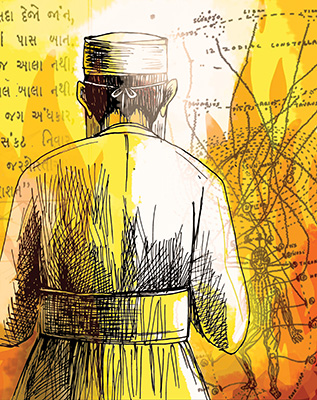The boiwala
Berjis Desai
Despite his thick-lensed spectacles, one could see that he was cross-eyed, in a pleasant sort of way. Decades of praying a million Atash Nyaishes before his padshah, with rapt devotion made his rather ordinary visage look bright and handsome. He could recite the Yatha Ahu Vairiyo and the Ashem Vohu, when he was barely three. A ninth generation priest, he perhaps felt a tinge of sadness that he only had two daughters. Though he knew, even before he married, that he would not father a son. His horoscope clearly said so. He was a self taught astrologer — casting horoscopes, providing life analysis, suggesting Avestan prayers and nirangs of Shah-e-Faridun to ease bad times, without charging a penny, of course.
He could have done with some extra rupees by moonlighting as an astrologer. However, he did not know what to do with money. He believed that he was a lucky man. His modest one-storeyed house was just across the Navsari Atash Behram. He was thus constantly esconced in the protective aura of the holy fire. His workplace was just 30 steps away from his home; his agiary, where he was the boiwala, was even older than the Atash Behram. His service was without a blemish. Even when he ran a temperature of 104°, his wife placed her torn mathoo-banoo (head scarf) dipped in iced water, with a few drops of precious Tata’s Eau de Cologne added, and he rushed to the agiary for the change of gah, as there was no companion mobed.

Illustration by Farzana Cooper
In the late ’60s, the agiary trustees paid him a salary of Rs 220 a month. More than adequate to feed spartan, vegetarian meals to his family of four. This was supplemented by his wife giving tuitions and spinning kustis, almost non-stop. The daughters helped too. At times, they could spin yarn and complete the elaborate process on their faithful jantar (a wooden contraption on which kustis are woven) to produce a ready-for-sale kusti in just 24 hours. They also sold some malabari sukhad (sandalwood). The vantage position of their home ensured a steady stream of customers, mostly from Bombay, visiting the Atash Behram. Few visited the agiary though (a breach of protocol — after you have paid obeisance to the King, you must bow to His Minister). Even those who did, were not as liberal in giving ashodad (gratuity). He was never the salesman priest who insisted on reciting Tandorosti (prayer for well-being) for the behdins. He would benignly smile at the worshippers — reading their auras and knowing what they really were. After all, he was a student of Khshnoom (Zoroastrian occult knowledge) as revealed by Ustad Behramshah Shroff. Few knew that the boiwala was both clairvoyant and clairaudient.
He was a voracious reader of books, journals and articles on Khshnoom. In the evenings, he walked to his friend’s house, again some 50 steps away from the agiary, to discuss esoteric Zoroastrianism. His bachelor friend was a school teacher by day, and a Khshnoom scholar by night. They poured over tomes about Zoroastrian cosmogenesis, the great power of manthric vibrations of potent Avestan prayers. The teacher would heat a large aluminum kettle over wood fire, to make tea with black pepper and only a little sugar, served in large ‘railway’ cups. Occasionally, the luxury of dunking a coarse batasa biscuit in the tea provided a warm mouthful in the chilly Navsari winter.
Although a core traditionalist, he was friendly with the legendary Gandhian social worker from Bombay, Burjorji Bharucha, who arranged navjotes of the legitimate and illegitimate children of Parsis having Adivasi mistresses in Vansda, a few miles from Navsari. The boiwala pardoned the Gandhian for his "misadventure.” During his stint in Bombay as a teacher in the Athornan Madressa, our boiwala had witnessed Bharucha’s many acts of kindness towards the Madressa students, mostly from poor families, feeding each child with chana and gor (gram and jaggery) to make them strong. The boiwala had read Bharucha’s aura and thought he was a slightly eccentric saint.
In any event, the priest was seldom judgmental of other practising mobeds — those who took short cuts in prayers or fleeced their behdins or used foul and abusive language during the 10-day seclusion period of purification (nahn) or led colorful lives. He quietly helped many a mobed in distress. Soft-spoken to the point of being inaudible, compassion dripped from his kind eyes.
No anger sat on his brow and no lust ever arose in his innocent self. He neither envied the rich nor did he beg or borrow, to educate well his two loving daughters (one became a postgraduate lecturer in the local college). He kept a safe distance from money. His tongue mostly prayed for the good of all he came across. He wore humility like a cloak to conceal that he was a decent astrologer and a fairly advanced psychic (other priests confided in him their spiritual experiences at night while tending the holy fire, and sought guidance). He must have silently healed thousands. Yet when he passed away quietly to the higher realms he had always yearned for, no obituaries or eulogies were published and no condolence meetings were held. Perhaps, few may have wept at his death. And, in any event, it was not required; for the angels themselves must have wept with joy, at his return.
Berjis M. Desai is a lawyer in private practice and a part-time writer. He considers himself an unsuccessful community activist.
